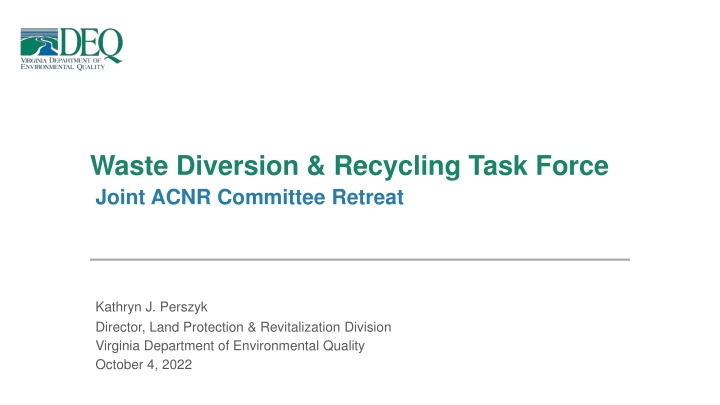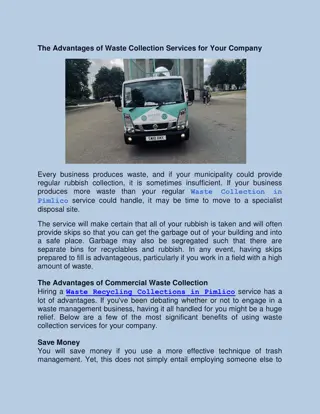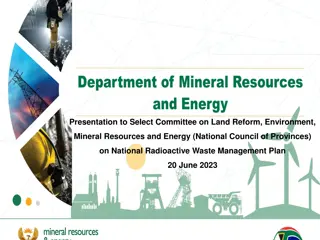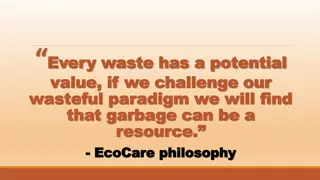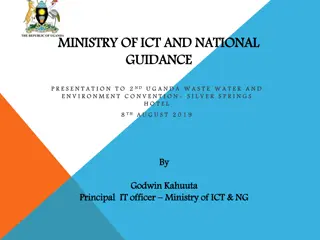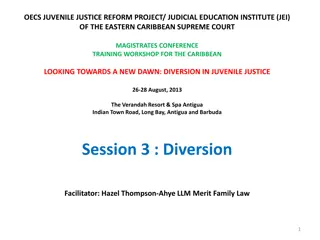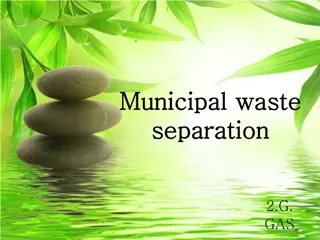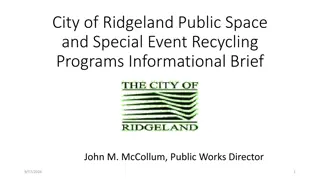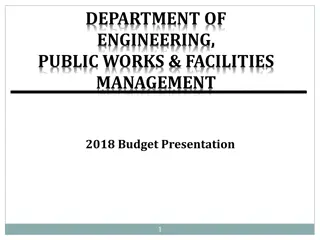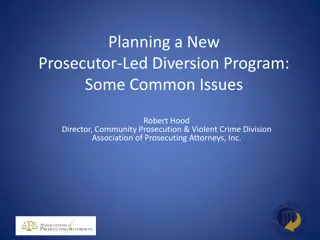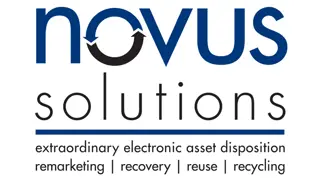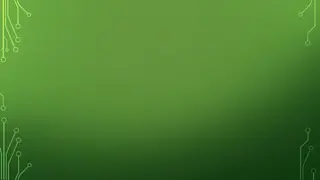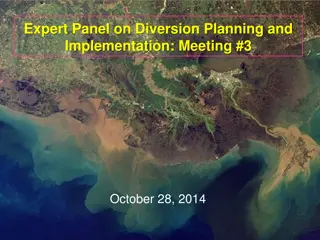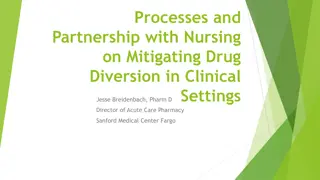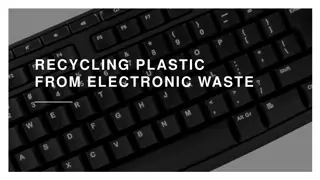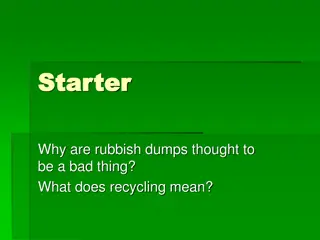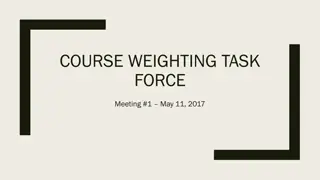Waste Diversion & Recycling Task Force Progress
Overview of the Waste Diversion & Recycling Task Force's activities, discussions, and findings in Virginia, focusing on key achievements, challenges, and future directions for waste management and recycling initiatives in the state.
Download Presentation

Please find below an Image/Link to download the presentation.
The content on the website is provided AS IS for your information and personal use only. It may not be sold, licensed, or shared on other websites without obtaining consent from the author.If you encounter any issues during the download, it is possible that the publisher has removed the file from their server.
You are allowed to download the files provided on this website for personal or commercial use, subject to the condition that they are used lawfully. All files are the property of their respective owners.
The content on the website is provided AS IS for your information and personal use only. It may not be sold, licensed, or shared on other websites without obtaining consent from the author.
E N D
Presentation Transcript
Waste Diversion & Recycling Task Force Joint ACNR Committee Retreat Kathryn J. Perszyk Director, Land Protection & Revitalization Division Virginia Department of Environmental Quality October 4, 2022
Howd we get here? Senate Bill 218 DEQ evaluation of recycling rates & provide recommendations for next 10 years 2018 Senate Document 7 published Nov 2019 DEQ s recommendations from SB218 evaluation 2019 Senate Resolution 42 Created WDRTF, named stakeholders, discussion points 2020 Senate Bill 1319 Extended the WDRTF, added stakeholders & study topics 2021 2
Waste Diversion & Recycling Task Force June 14, 2022 October 13, 2021 Meeting 1 Meeting 2 Meeting 3 Meeting 4 March 15, 2022 August 16, 2022 Waste Reduction & Diversion Bottle Redemption Programs Litter Grant Finalize Report (due Nov 1) EO17 Encourage Recycling Businesses Improve Recycling Food Waste Policies Litter Grant Report Work Food Donation & Composting EV Batteries 3
Overarching Themes of Task Force Discussions Need for specialized expertise Lack of data Need for funding 4
Waste Management in Virginia ACTIVE SOLID WASTE FACILITIES 71 Solid Waste Planning Units (SWPUs) o Solid Waste Management Planning (20yr) o Recycling Rate Reporting / Action Plans Compost, 15 Mix of Solid Waste Owners & Operators o Locally owned/operated facilities o Authority owned/operated o Locally or Authority owned / Privately operation o Privately owned/operated (host agreements) MRF, 55 Landfills, 87 25% waste received from out of state Waste to Energy, 6 Transfer Station, 55 5
Solid Waste Managed, CY2021 Recycling (On/Off-Site) 14% Reporting by permitted Solid Waste Management Facilities Composted 1% Landfilled 13.5M tons Incinerated 12% Recycling includes: Mulching On-site recycling Sent to off-site recycling facility Other on-site management Landfilled 73% 7
Current Recycling Requirements Recycling Rates ( 10.1-1411 D): o25% Recycling Rate, except o15% - SWPUs with: population density < 100 persons / square mile, OR unemployment rate 50% higher than state average o3 SWPUs failed to meet rate for CY2020 Recycling Reporting ( 10.1-1411 E): oAnnually, SWPUs with population > 100,000 (17) oAll Others - every 4 years Localities expressed challenges collecting data from businesses 9
Waste Reduction & Diversion Recommendations Develop a Capacity Analysis for Waste & Diversion Systems Study Extended Producer Responsibility (EPR) frameworks Remove Locality Burden Additional Cost to Manufacturers & Consumers Improve Waste Stream Quality Transportation Efficiencies Increase tire recycling fee, ensure revenue supports tire recycling 10
Recommendations to Improve Recycling Establish a Recycling Business Assistance Center (RBAC) oConduct recycling impact studies oProvide permit assistance oCoordinate info on funding opportunities oResearch recycling markets oWork with companies on needs oNews Releases to public on successes & recycling industry 11
Recommendations to Improve Recycling Funding for grants & incentives for recycling infrastructure oCapital expenses for containers, vehicles, processing equipment, site improvements oDevelop public & regional private recycling services / facilities Siting glass processing facilities oNeed information on availability of glass, economic incentives Recycling information for multi-family housing complexes 12
Litter Prevention & Recycling Grant, 2021 Stats Revenue Litter Tax ( 58.1-1707) $1.6M Excise Tax on Soft Drinks ( 58.1-1702) $230K Excise Tax on Beer and Wine Coolers ( 4.1-235 & 4.1- 236) $930K $2.78M Grant Awards Non-Competitive Grant awards $1.71 M, 187 Localities Competitive Grant awards $95K, 13 Localities Future Grants for Polystyrene Information Campaigns (5%) 13
Litter Prevention & Recycling Grant Recommendations Funding: oMake litter tax proportional to business size oEnsure fast food & restaurants paying into fund oSend automated reminders / bills oExamine other funding sources Grant Eligibility & Reporting: oExpand grant eligibility to regional planning district commissions oInclude quantity of waste diverted / collected 14
Food Donation & Organics Management Recommendations Remove barriers to feeding people & feeding animals while maintaining health & safety Possible suggestions that need appropriate stakeholder consideration: oModify 35.1-14.2 to allow non-profit entities & faith-based organizations sponsoring or holding food-based events to donate excess food oIncrease tax credit offered under 58.1-439.12:12 to farmers for the donation of food crops to nonprofit food banks. Similar tax credits could be extended to retail stores and other generators of food to encourage such donations. 15
Food Donation & Organics Management Food Donation & Organics Management Recommendations Financial incentives to encourage food waste prevention & establish compost and anaerobic digestion (AD) facilities Organics Management Coordinator Develop regulatory requirements for AD facilities Legislation to require food waste diversion from disposal for large commercial generators of food wastes Encourage use of compost 16
Electric Vehicle & Grid Battery Wastes More expertise needed HB 774 / SB499 (2022) SCC to create a Task Force to analyze the life cycle the life cycle of renewable energy facilities (including battery storage) and assess the feasibility, costs, recycling and salvage opportunities, waste strategies, and liability for the decommissioning of materials. 17
